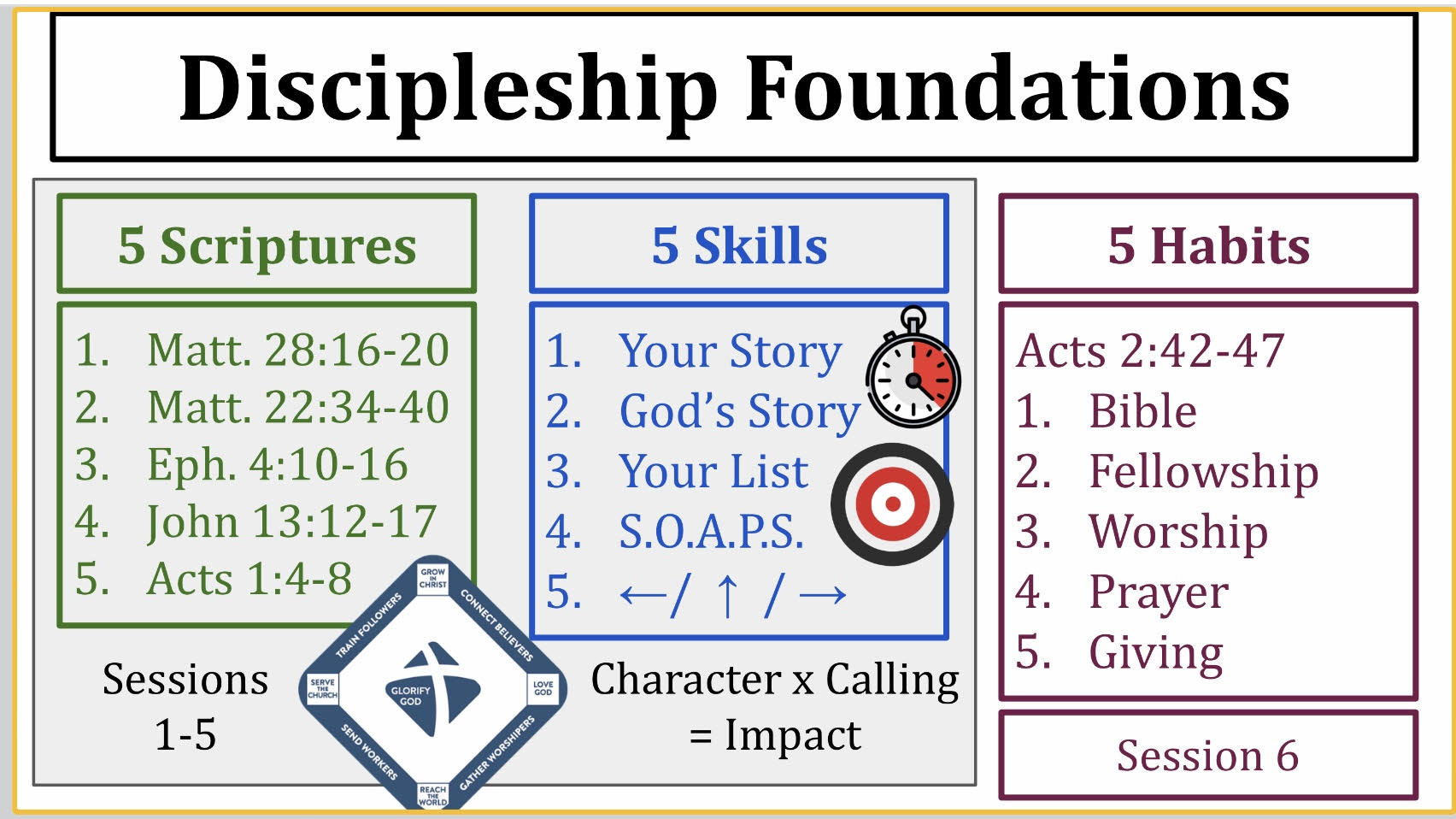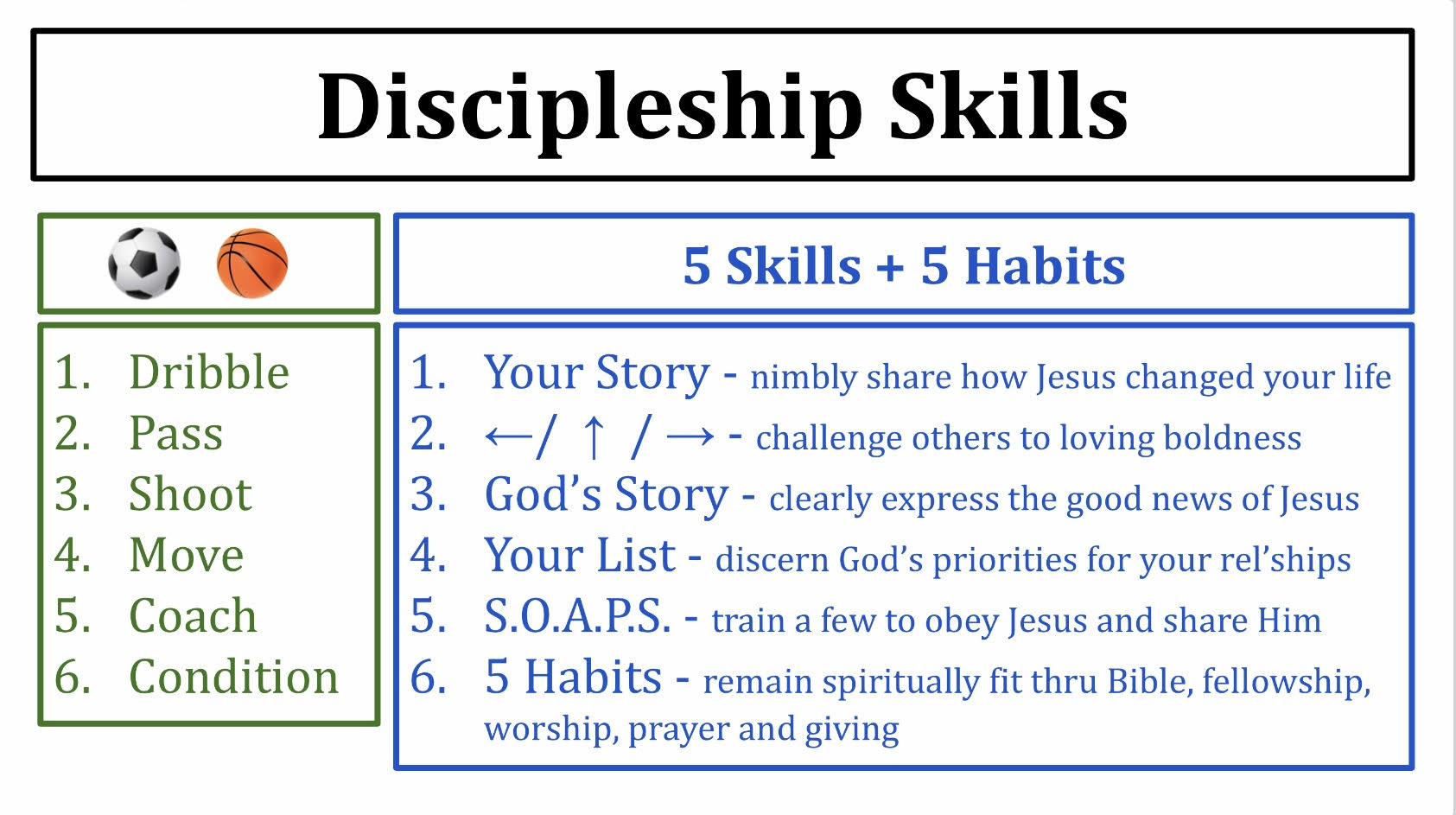
We have condensed our approach to discipleship into six sessions and six Bible passages. These are meant to activate a believer in five key skills and five vital habits, propelling them from passively knowing Jesus to actively obeying His command to make disciples who make disciples. These skills and habits are oriented around our baseball diamond pathway and are the necessary foundational practices to help you grow in character and calling.
Session 1 – S.O.A.P.S. study the Great Commission being sure to focus on Application, Prayer and Share. Practice sharing your story in 30 seconds and commit to share your story with one believer and one non-believer.
Session 2 – Practice the 3 thirds structure (look back, look up, look ahead) by lovingly debriefing on how you did with your commitments from last time. Did you share your story with a believer and a non-believer? Why or why not? By all means take an extra meeting or two to keep practicing and refining your testimony and praying for boldness to share with people. Only when obedience becomes both expected and practiced move on to the Great Commandment for the next S.O.A.P.S. study. If the five habits are unfamiliar to some in your D-Group be sure to take time to discuss how to start and grow in them.
Session 3 – Practice 3 thirds. Review your obedience and encourage each other. When ready, S.O.A.P.S. study Eph. 4:10-16 and discuss how loving God (first base) moves us to grow in Christ (second base), serve the church (third base) and reach the world (home plate). Practice sharing the gospel using the 2 Kingdoms method. Pray for wisdom and boldness to share this presentation with one believer and one non-believer in your life.
Session 4 – Review obedience – wins and losses. Stay positive and encouraging. Take an extra session or two to improve your proficiency with the 2 Kingdoms. Introduce the skill of working your list – a prioritized identification of the people in your life, like a bullseye. Who are you most responsible to reach? Who are the people closest to you? Brainstorm all of the non-believers you know, in every area of your life. Prayerfully identify the top few and pray for opportunities to share your story and the gospel with them. When ready, S.O.A.P.S. study John 13:12-17, the foot-washing passage.
Session 5 – Review obedience. S.O.A.P.S. study Acts 1:4-8. In your looking ahead segment of the meeting discuss the five skills and which ones you are strongest and weakest in exercising. Consider what resource might be most helpful to strengthen a weaker skill.
Session 6 – Review obedience. S.O.A.P.S. study Acts 2:42-47 and discuss how you’re doing with spiritual disciplines like prayer, Bible study and fellowship. Make a decision as a group about what base (love, grow, serve, reach) you’d like to focus on moving forward and choose a resource that would help you – a book, Bible study, etc.
Here is another way to look at these foundational skills and habits:

Every sport has a few key skills that allow you to start playing, and the more you master them, enable you to play at increasingly advanced levels. In soccer and basketball the four key skills are: dribble, pass, shoot and move. These translate beautifully to the Christian life.
DRIBBLE – in order to advance the ball and score a goal or basket you have to stay in control. Speed can be helpful at times but ball control is essential and specialty moves can be developed to get around even the most skilled defenders. As a follower of Jesus self-control is necessary for personal growth and ministry. Being able to control your thoughts, words and actions allows you to navigate the obstacles and opportunities of life. The “dribbling” skill we practice is knowing and sharing your story. This is very useful for outreach, engaging people with the testimony of how Jesus changed your life. But knowing your temptations and sins, knowing your strengths and weaknesses, is very important to every way you exercise self-control. As you share how Jesus has changed and is changing your life it can be very encouraging to other believers as well.
PASS – individual skill can only take you so far in a sport like soccer or basketball. You have to work with your teammates in both offense and defense, taking advantage of the abilities of the people around you in order to win. This is also profoundly true in the Christian life. Every time you contact or meet with another believer you have an opportunity to “pass them the ball” by asking about their spiritual life. They might “drop the ball” by deflecting the question or they might receive it and pass it back by asking how you are doing. The three-thirds structure of looking back, looking up and looking ahead is our “passing drill” in discipleship. Every meeting should begin with “how did it go?” type questions that look back on the previous week. We drop the ball or fail to pass when we don’t include this vital component of loving accountability. How have you encouraged and challenged another believer recently?
SHOOT – everyone knows you can’t win a game if you don’t score points. The “game” of disciplemaking includes the vital skill of sharing the good news of Jesus Christ. If we build loving, long term relationships with our friends and neighbors but never share the gospel we are failing to “shoot,” and those loved ones cannot “win” because apart from hearing the message they cannot be saved. The two kingdoms approach is just one method – you might prefer the bridge illustration, the 4 spiritual laws or the wordless book. The best players have several ways they can shoot – why not have a few good methods practiced up and ready to go?
MOVE – a player who stands still on the field is not much use. They are very easy to defend and make no real contribution to the game. Great players develop a keen sense of where to be on the field to best help the team in both offense and defense. Significantly, the Great Commission begins with the word, “Go.” Christians are not meant to stand still. We should be on the move, always seeking opportunities to love and serve other believers and to reach out to not yet believers. Keeping a list of people you know who don’t know Jesus is a helpful tool to guide your prayers and to prioritize your outreach efforts. Where is the Lord leading you to go this week?
COACH – followers of Jesus are not just players in the game of discipleship, we are all called to be disciple-makers. Christianity is not a spectator sport, but an engaged life. Jesus had three disciples (Peter, James and John) he invested in more than the others. He focused his three year ministry on the twelve apostles, knowing they would go on to influence the 72 and beyond. S.O.A.P.S. is a useful coaching tool to train obedience in our D-Groups. Let’s not just be hearers of the word, but be do-ers of the word, always remembering to Apply, Pray and Share what we are learning.
CONDITION – every athlete knows the importance of remaining in peak physical condition. Followers of Jesus know that training in godliness is even more important than physical training. Practicing the five habits in Acts 2:42-47 (Bible study, fellowship, worship, prayer and giving) keeps us spiritually healthy and vibrant. These and other spiritual disciplines keep us connected with Jesus as our source of life, power and direction. As with all kinds of training, it helps to have an experienced coach and a training partner or two. What kind of shape are you in spiritually these days?
Join a D-Group today and never stop improving your skills and habits!
We believe these five skills (your story, 3 3rds, God’s story, your list, S.O.A.P.S.), along with the five habits (Bible, prayer, worship, fellowship, giving) are the FOUNDATIONAL keys to being and making disciples. We never stop practicing these things and we should never stop growing in them. These concepts can be introduced in just six meetings but will take years to refine and develop – as with any other skill or discipline (sports, music, vocation, hobby, etc.). So after the six session orientation to D-Groups (that might take 10-12 meetings), a shift takes place from foundational to formational discipleship.
“For no one can lay a foundation other than that which is laid, which is Jesus Christ. Now if anyone builds on the foundation with gold, silver, precious stones, wood, hay, straw— each one’s work will become manifest, for the Day will disclose it, because it will be revealed by fire, and the fire will test what sort of work each one has done.” 1 Corinthians 3:11-13

Our goal is to forge and reinforce a Christ-centered identity in people that expresses itself in the regular exercise of these skills and habits. As our baseball diamond illustrates, we are trying to place the cross and the glory of God at the center of our hearts and lives. On that gospel foundation, we seek to build our lives as disciple-makers who coach others to come with us in the life-long process of loving God, growing in Christ, serving the church and reaching the world.
The task of the D-Group leader is to discern the needs of the group members in terms of how they need to grow in a particular season. The Character & Calling Worksheet is designed to help clarify areas of greatest need for people.
- Do they need help securing their identity in Christ? Consider taking a few months to work through Neil Anderson’s Victory over the Darkness.
- Do they need to grow in the practice of spiritual disciplines to love God and develop a deeper intimacy with Him? Study and apply the principles in David Mathis’ Habits of Grace.
- Do they need to deepen their character and overcome some personal challenges? Discuss Colin Smith’s Momentum to follow the pathway to growth and blessing in the beatitudes.
- Do they need to discover their spiritual gifts and passions to focus their kingdom ministry? Walk through Rob Wegner’s Find Your Place to follow your the GPS signals of your gifts, passions and story into your unique ministry calling.
- Do they need help connecting with and reaching out to non-believers? Study and apply Jeff Vanderstelt’s Saturate to create space in your life to intentionally love and reach those far from God.
These are simply suggestions and starting points – choose the resource that will best serve the people in your group in this season of their lives. Here are some additional suggestions to consider:
IDENTITY IN CHRIST:
- Who am I? – Jerry Bridges
- The Ragamuffin Gospel – Brennan Manning
- Defined – Stephen Kendrick
LOVE GOD:
- Don’t Waste your Life – John Piper
- Prayer – Tim Keller
- Awe – Paul Tripp
GROW IN CHRIST:
- The Pursuit of Holiness – Jerry Bridges
- The Cost of Discipleship – Dietrich Bonhoeffer
- The Hole in our Holiness – Kevin Deyoung
SERVE THE CHURCH:
- The Purpose Driven Life – Rick Warren
- Spiritual Gifts – Thomas Schreiner
- Servant Leadership – Robert Greenleaf
REACH THE WORLD:
- God Space – Doug Pollock
- The Master Plan of Evangelism – Robert Coleman
- B.L.E.S.S. – Dave Ferguson
